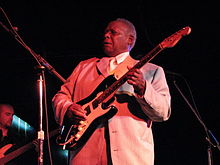Byther Claude Earl John Smith (April 17, 1932 – September 10, 2021)[1][2] was an American blues musician[3] who worked with Muddy Waters, Howlin’ Wolf, Jimmy Reed, Otis Rush and Junior Wells.[4]
Byther Smith | |
|---|---|
 Smith at the Silver Dollar Room, Toronto, 2008 | |
| Background information | |
| Birth name | Byther Claude Earl John Smith |
| Also known as | Byther Smith, Byther Smitty Smith |
| Born | April 17, 1932 Monticello, Mississippi, U.S. |
| Died | September 10, 2021 (aged 89) Chicago, Illinois, U.S. |
| Genres | Blues, electric blues |
| Occupation | Musician |
| Instrument(s) | Guitar, vocals |
| Years active | Late 1950s–2021 |
| Labels | Delmark, Bullseye, Black and Tan |
Biography
editEarly life
editBorn in Monticello, Mississippi, United States, Smith's early music experiences revolved around gospel music.[4] Orphaned, Smith was brought up by his uncle and aunt.[5] In his teenage years he moved to Arizona to work on a cattle ranch and played in a country and western band on weekends.[4] He worked in construction and local farmhands taught him to play the double bass.[5] Around this time Smith showed an interest in boxing, so his aunt bought Smith an electric bass guitar to encourage him to follow a musical path instead.[5]
Career
editSmith migrated to Chicago in the mid-1950s with his wife, Etta Mae.[5] In the early 1960s he began performing in clubs, learning guitar from J. B. Lenoir (his first cousin who had encouraged him to migrate[5]), Robert Lockwood, Jr., and Hubert Sumlin.[3] He worked regularly as rhythm guitarist for Otis Rush.[5] During this period he recorded a number of singles with labels such as Bea & Baby, Cruise and Apex but in 1965 returned to his gospel roots with a group called the Gospel Travellers.[4] In the 1970s he joined the house band at Theresa’s Tavern where he worked for five years, often playing with Junior Wells.[4][5] In 1974 he recorded various tracks with Sunnyland Slim for Slim's later album 'She Got A Thing Goin' On'.[6] In the late 1970s, Smith toured with the likes of Big Mama Thornton and George "Harmonica" Smith.[5]
After years playing in clubs all over the world, a demo tape Smith recorded became the album Tell Me How You Like It, released by the Texas-based Grits record label. His next release in the United Kingdom was Addressing the Nation with the Blues for JSP Records.[7] In 1995, Smith retired from his job at Economy Folding Box Company after twenty-five years, allowing him to focus fully on music.[citation needed] Smith retired from touring in 2015.[6]
Delmark Records boss Bob Koester observed, "There's a mellowness there that is disappearing in all but B.B. King".[7]
Byther Smith died in Chicago on September 10, 2021, aged 89.[8]
Discography
editSingles
edit- "Thanks You Mr. Kennedy" / "Champion Girl", EDA Records 1556 (1962)
- "So Unhappy" / "Money Tree", Be Be Records 101 (1974)
- "What Have I Done" / "Sweet Sixteen", Be Be Records 102 (1976)
- "Tell Me How You Like It" / "Come On In This House", Grits GR-4500 (1983)
Albums
edit- Hold That Train, Delmark (1981)
- Tell Me How You Like It, Grits (1983)
- Big Shot Smitty, Mina Records 1002 (1984)
- Gritty Soul, Mina Records LP-M1004 (1985)
- Addressing The Nation With The Blues, JSP Records (1989)
- Housefire, Bullseye (1991)
- I'm A Mad Man, Bullseye BB 9527 (1993)
- Mississippi Kid, Delmark (1996)
- All Night Long, Delmark (1997)
- Smitty’s Blues, Black and Tan (2001)
- Throw Away The Book, Black and Tan (2004)
- Blues on the Moon: Live at the Natural Rhythm Social Club, Delmark (2008)
- Got No Place To Go, Fedora FCD 5034 (2008)
See also
editReferences
edit- ^ "Byther Smith". Lawrencecountypress.com. Retrieved 11 October 2021.
- ^ Eagle, Bob; LeBlanc, Eric S. (2013). Blues - A Regional Experience. Santa Barbara: Praeger Publishers. p. 119. ISBN 978-0313344237.
- ^ a b Dahl, Bill (1933-04-17). "Byther Smith – Music Biography, Credits and Discography". AllMusic. Retrieved 2013-03-10.
- ^ a b c d e "Byther Smith Biography". Blackandtanrecords.com. 7 February 2016. Retrieved 2020-08-06.
- ^ a b c d e f g h Komara, Edward M. (2006). Encyclopedia of the Blues. Psychology Press. p. 896. ISBN 0415926998.
- ^ a b Frank, Michael. "Byther Smith". Earwig Music. Retrieved 2020-08-06.
- ^ a b Russell, Tony (1997). The Blues: From Robert Johnson to Robert Cray. Dubai: Carlton Books. p. 167. ISBN 1-85868-255-X.
- ^ "Byther Smith", The Tylertown Times, September 27, 2021. Retrieved October 3, 2021
External links
edit- The Blue Highway
- Byther Smith discography at Discogs
- Byther Smith at IMDb